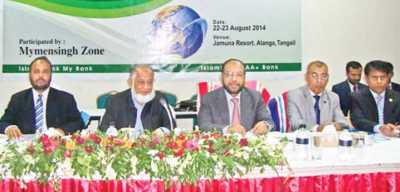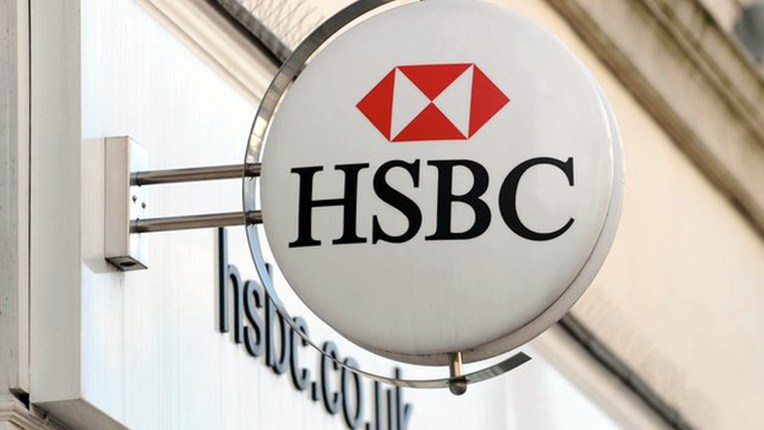Rupali Bank signs deal with BB on Tk 200 crore refinancing scheme

The agreement was signed at a function at the BB’s head office in Dhaka recently, said a press release.
IBBL holds business development confce in Mymensingh

The conference was held at Jamuna Resort in Tangail, said a press release.
Engr. Md. Eskander Ali Khan, Chairman, Executive Committee of the bank was present in the conference as chief guest.
Presided over by Mohammad Abdul Mannan, Managing Director of the bank the conference was attended by Md. Shamsuzzaman, Md. Nazrul Islam Khan, Md. Motiar Rahman, Executive Vice Presidents, Dr. Md. Kamal Uddin Jasim, Senior Vice President.
Officials including heads of 18 branches and manager operations of the bank were also present.
HSBC boss makes ‘capital flight’ claim

Uncertainty over an independent Scotland’s currency could lead to “capital flight” from the country, the chairman of HSBC has claimed.
Writing in the Telegraph, Douglas Flint said supporters of independence were “advocating a giant step into economic uncertainty”.
Mr Flint donated £25,000 to the Better Together campaign last year.
Yes Scotland argued that a currency union was in the interests of Scotland and the UK, and would be agreed.
Currency has been a major issue in the independence debate ahead of the 18 September referendum.
The Scottish government has proposed continuing to use sterling in a formal currency union with the rest of the UK if voters back independence.
But the UK government and the main Westminster parties have said they would rule out such a deal.
Alternatives could include “sterlingisation” – using sterling without the Bank of England as lender of last resort – joining the euro or setting up a separate Scottish currency.
Pro-Union campaigners have pressed First Minister Alex Salmond to set out a “Plan B” but he has refused to do so, insisting that the UK government would negotiate a currency union if there is a “Yes” vote.
‘Financial stability’
Mr Flint, who is group chairman of HSBC Holdings and describes himself as an “exiled Scot”, wrote: “It is hard to imagine Scotland without the anchor of financial stability that it derives from sterling currency union.
“That is why the pro-independence campaign would like to recreate a currency union in the event that Scotland separates from the rest of the UK.
“If there was a better alternative that improved the future prospects of Scotland it would surely have been promoted vigorously.”
He added: “The alternatives to a currency union include a completely independent currency, passive acceptance of a monetary policy designed in London for the rest of the UK, or, assuming Scotland rejoins the European Union, eventual membership of the euro.
“In all these circumstances, the transition from the existing currency union would be complex and fraught with danger.
“At the extreme, uncertainty over Scotland’s currency arrangements could prompt capital flight from the country, leaving its financial system in a parlous state.”
HSBC is the second largest bank in the world but has a relatively small presence in Scotland, with 10 branches.
BB awards two economists posthumously

Prof Muzaffer Ahmad and Swadesh Ranjan Bose were posthumously given Bangladesh Bank Award 2013 yesterday for their contribution to the economy and development of the country.
Finance Minister AMA Muhith handed the awards to the wives of the country's two eminent economists at a programme at Bangladesh Bank Training Academy in the capital. The award comprises a gold medal, Tk 1 lakh in cash and a crest.
The two were awarded for their creative research and works on development economics, said Bangladesh Bank Governor Atiur Rahman, also the chief of the jury board, while recalling their contribution.
Prof Ahmad was best known for his diverse research on industry, education, international economics, public enterprises, human rights, health economics, labour relations, good governance, rural development, poverty reduction and environment.
He led Transparency International Bangladesh for a few years to fight corruption in the country. As one of the leading environmentalists, he angered land grabbers and river polluters.
Bangladesh Economic Association awarded him the Gold Medal (posthumously) in 2010. He was awarded the Independence Day Award, the highest state award given by the government in 2013, four years after his death.
At the ceremony, noted economists showered praises on both economists. "As a frontline economist, Muzaffer Ahmad contributed significantly to imparting knowledge of economics," said Qazi Kholiquzzaman Ahmad, an economist.
"He fought for poverty alleviation, good governance and civic rights," he said.
Accepting the award, Roushan Jahan, wife of Prof Ahmed, thanked the central bank for awarding her husband.
“I have come to realise that many still remember him. This is the biggest consolation for me and my family."
Noorjahan Bose, wife of Bose, received the award on behalf of her husband. Economists Prof Rehman Sobhan, Nurul Islam and Prof Mosharaff Hossain were among the previous recipients of the Bangladesh Bank Award introduced in 2000.
News:The Daily Star/21-Aug-2014Co-operative Bank announces losses of £75.8m
LONDON: The Co-operative Bank has lost nearly 30,000 account holders.
The Co-operative Bank has announced pretax losses of £75.8m for the first six months of this year and admitted that “much needs to be done” to stabilise an institution that has seen 28,000 customers leave since January.
The deficit is a significant narrowing of the £844.6m loss during the same period in 2013 but the bank admitted that a year of upheaval, which involved its parent organisation, the Co-operative Group, ceding control to US hedge funds, had been followed by the loss of 28,199 current accounts in the six months to 30 June.
Describing every customer loss as a “mortal wound”, the chief executive, Niall Booker, said the bank was not expected to be in profit this year or in 2015 and there would continue to be job losses and a further 25 branch closures.
“We are still guiding that we won’t make profits in 2014 and 2015 and we are not changing that guidance,” he said on Friday morning. The bank has not said whether it expects to be in profit by 2016.
Booker said the “deep-rooted issues” would continue to affect performance for some time. The bank’s overall loss last year, caused by overambitious growth plans, was £1.3bn.
“Considering the scale of the challenge we faced a year ago we are encouraged by the progress made to ensure the stability of the bank. By the measures of capital and liquidity the bank is considerably stronger than it was a year ago. We are ahead of schedule in the disposal of non-core assets and have improved governance, particularly at board level. However, the issues we continue to face in building a sustainable business are deep-rooted and there remains much to be done,” he said.
“Transforming the organisation into a viable and profitable business which generates capital in the long term still requires significant change – both operationally and culturally.
“The core bank continues to remain stable. In the first half of the year more people switched into the bank than in the second half of 2013. Although we have also seen an increase in the number of people switching out of the bank, the net numbers remain small relative to our total number of current account customers whose continuing loyalty is deeply appreciated. Recent trends suggest this net outflow of retail customers has slowed.”
The bank had a net outflow of 28,199 accounts. Booker said: “The loss of any customer is a mortal wound for anyone like me who has worked in the industry for a long period of time.” He added that the results, while disappointing, were not as bad as they could have been. —The Guardian



